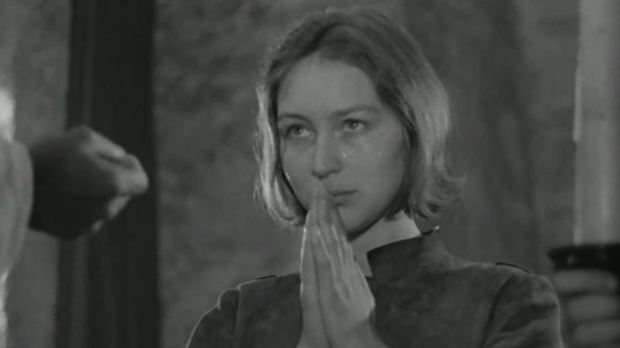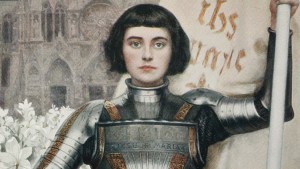As the Church celebrates Joan of Arc on May 30, the patron saint of France and one of the heroines of the country’s history has been the subject of numerous films. Among the most famous is the classic “The Trial of Joan of Arc” by Robert Bresson, originally released in 1962.
The filmmaker’s wife, Mylène Bresson, has collected chronologically, over forty years, the interviews of the director who wanted to be a cinematographer first and foremost – as opposed to merely a success in the entertainment industry. Many journalists have sought out Robert Bresson’s words, for they were rare and therefore precious even in his time. He hated talking about nothing. His words are as precise as his film plans, his ideas as demanding as his screenplay dialogues.
In more than 300 pages, this collection, simply entitled Entretien, takes us back to the heart of the work of one of the greatest French directors, through chapters devoted to each of his films. The longest passage concerns “The Trial of Joan of Arc” (1962). Through Florence Delay’s masterful portrayal, the filmmaker allows us to see Joan of Arc facing her judges, heroine going to the stake. Voluntarily stingy with words, Robert Bresson had on occasion freed himself from this asceticism, passionate about the the virgin of Orleans, transported by her life and animated, no doubt, by what Joan herself has left to him.
Joan, the audacious muse
Joan was his muse as well as the illustrious character of one of his greatest films. So much so that Robert Bresson speaks of her as if she had appeared to him. In front of Jean Guitton, a famous Catholic writer, he once confessed to the Centre Catholique des Intellectuels Français what struck him about Jeanne: “Her youth, her magnificent insolence in front of the Princes of the Church and scholars ready to send her to the fire (…), her purity, this state of cleanliness (…), a state outside of which she knew that nothing great, nothing glorious could be done. (…) The analogy of her passion with the Passion of Christ.” And he further adds, “The elegance of the language that she uses” because “without touching a pen, Jeanne did the work of a writer.” Better still, for him, one thing is certain: “Jeanne was not raped in prison, since she speaks, before the torture, of her “pure body, in its entirety, which was never corrupted.”
To a question from the audience, he answers: “It seems that she was a more perfect being than us, more sensitive. She combines her five senses in a new way. She sees her Voices. She convinces us of a world at the limit of our faculties. She penetrates this supernatural world, but she closes the door behind her.” (Interviews published in Études cinématographiques, N°18-19). What is beautiful about Bresson’s relationship with Jeanne is his ability to believe her without ever doubting her. Reading her, he feels familiar with her language, finds himself in her need for speech, and thus guesses her soul. And no doubt he identified with her in her struggle – he who, then self-taught, had struggled all his life to convince producers – when he declared to the journalist of the magazine Le Film Français: “She stood up to the most learned doctors and theologians of her time. Even today, her prudence, her finesse, her intelligence fill us with admiration.
The superiority of Joan, the envoy of God
The director, who produced “The Diary of a Country Priest” in 1951, chose Joan of Arc for the subject of his sixth film. He has a taste for grace in his work. His film devoted to the trial of Joan of Arc focuses on injustice, to be sure, but also reveals the mystery of the inner life of the young girl and on the emotion, above all, that she arouses, capable of filling any spectator with wonder, much more than the vision of her horseback rides.
Bresson sees Jeanne “with the eyes of a believer”, he assured André Parinaud, a journalist for Arts. “I believe in the mysterious world to which she opens a door and closes it.” Parinaud asked him how he explains the ascendancy of Jeanne over the men of her time. Bresson replied: “By a combination. She is the envoy of God. She is beautiful, young, elegant. She also got her power from her genius; from her nobility, that true nobility that comes directly from the earth; from her purity; from her simplicity” (she refused the veneration of the crowd).
Joan of Arc was an exceptional human being. Someone who would have graced any century, any place in the world!
But beyond the trial that he had to study thoroughly, Bresson has a keen awareness of what Joan’s life represents. Much more than some French historians or politicians. “There is no doubt that she put France back on its feet, unified and strengthened it, and there is no doubt either that, paradoxically, she strengthened the Church. She also changed the face of France and the whole of Europe for many centuries to come.” And this word of Bresson’s, in which he recalls how Jeanne associated “the life of Heaven with the life of the Earth and with history”, how “the love of country” helped her to “chase away the occupier”, actualizes and makes necessary the role of the saints today, not only for the Church, but for history itself.
The journalist, Parinaud, later admitted to having changed his view of the saint after seeing the film, having found in it “Joan of Arc pure and simple” thanks to the personal vision of the director. He sums up very well the power of this work to make us discover the truth of Joan, who she is and how she could be this savior of France still so admired today. “Joan of Arc was an exceptional human being. Someone who would have honored any century, any place in the world! Someone superior to the most superior of men. These are the ideas I have of Joan now, thanks to you!”




